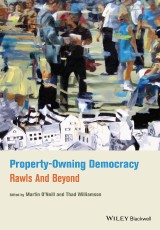Details

Property-Owning Democracy
Rawls and Beyond1. Aufl.
|
30,99 € |
|
| Verlag: | Wiley-Blackwell |
| Format: | |
| Veröffentl.: | 17.01.2012 |
| ISBN/EAN: | 9781444355161 |
| Sprache: | englisch |
| Anzahl Seiten: | 336 |
DRM-geschütztes eBook, Sie benötigen z.B. Adobe Digital Editions und eine Adobe ID zum Lesen.
Beschreibungen
<i>Property-Owning Democracy: Rawls and Beyond</i> features a collection of original essays that represent the first extended treatment of political philosopher John Rawls' idea of a property-owning democracy. <ul> <li>Offers new and essential insights into Rawls's idea of "property-owning democracy" </li> <li>Addresses the proposed political and economic institutions and policies which Rawls's theory would require</li> <li>Considers radical alternatives to existing forms of capitalism</li> <li>Provides a major contribution to debates among progressive policymakers and activists about the programmatic direction progressive politics should take in the near future </li> </ul>
<p>About the Editors vii</p> <p>Notes on Contributors viii</p> <p>Acknowledgments xi</p> <p>Foreword xiii<br /> <i>Joshua Cohen and Joel Rogers</i></p> <p>Introduction 1<br /> <i>Martin O’Neill and Thad Williamson</i></p> <p><b>Part One: Property-Owning Democracy: Theoretical Foundations 15</b></p> <p>1 Justice or Legitimacy, Barricades or Public Reason? The Politics of Property-Owning Democracy 17<br /> <i>Simone Chambers</i></p> <p>2 Property-Owning Democracy: A Short History 33<br /> <i>Ben Jackson</i></p> <p>3 Public Justification and the Right to Private Property: Welfare Rights as Compensation for Exclusion 53<br /> <i>Corey Brettschneider</i></p> <p>4 Free (and Fair) Markets without Capitalism: Political Values, Principles of Justice, and Property-Owning Democracy 75<br /> <i>Martin O’Neill</i></p> <p>5 Property-Owning Democracy, Liberal Republicanism, and the Idea of an Egalitarian Ethos 101<br /> <i>Alan Thomas</i></p> <p>6 Property-Owning Democracy and Republican Citizenship 129<br /> <i>Stuart White</i></p> <p><b>Part Two: Interrogating Property-Owning Democracy: Work, Gender, Political Economy 147</b></p> <p>7 Work, Ownership, and Productive Enfranchisement 149<br /> <i>Nien-h</i><i>ê Hsieh</i></p> <p>8 Care, Gender, and Property-Owning Democracy 163<br /> <i>Ingrid Robeyns</i></p> <p>9 Nurturing the Sense of Justice: The Rawlsian Argument for Democratic Corporatism 180<br /> <i>Waheed Hussain</i></p> <p>10 Property-Owning Democracy or Economic Democracy? 201<br /> <i>David Schweickart</i></p> <p><b>Part Three: Toward a Practical Politics of Property-Owning Democracy: Program and Politics 223</b></p> <p>11 Realizing Property-Owning Democracy: A 20-Year Strategy to Create an Egalitarian Distribution of Assets in the United States 225<br /> <i>Thad Williamson</i></p> <p>12 The Empirical and Policy Linkage between Primary Goods, Human Capital, and Financial Capital: What Every Political Theorist Needs to Know 249<br /> <i>Sonia Sodha</i></p> <p>13 The Pluralist Commonwealth and Property-Owning Democracy 266<br /> <i>Gar Alperovitz</i></p> <p>14 Is Property-Owning Democracy a Politically Viable Aspiration? 287<br /> <i>Thad Williamson</i></p> <p>Index 307</p>
<p>"In this very instructive, wide-ranging, and most welcome volume, Martin O'Neill and Thad Williamson have assembled fourteen thoughtful essays and a substantial introduction which together explore its meaning and history, and the prospects of its implementation. The book has a great deal to interest political philosophers and theorists, political scientists, political economists, and reflective political activists on the left." (<i>Notre Dame Philosophical Reviews</i>, 8 July 2013)</p> <p> </p>
<p><b>Martin O’Neill</b> is Senior Lecturer in Political Philosophy in the Department of Politics at the University of York.<br /> <br /> <b>Thad Williamson</b> is Associate Professor of Leadership Studies and Philosophy, Politics, Economics and Law, University of Richmond.</p>
<p>Is social justice possible within capitalist societies? Or should progressives and egalitarians be looking for viable alternatives to free-market capitalism? John Rawls, one of the most influential political philosophers of the last century, advanced the view that social justice is indeed impossible within the constraints of the capitalist welfare state. Rawls believed that familiar capitalist societies in which a small minority holds a massively disproportionate share of wealth could not possibly be just. Instead, he argued that justice requires a different form of socioeconomic organization, one in which human and nonhuman capital is dispersed widely. He called it a “property-owning democracy.”</p> <p><i>Property-Owning Democracy: Rawls and Beyond</i> presents the first extended treatment of Rawls’s important ideas about the practical implementation of his theory of justice. Contributors to this volume approach Rawls’s idea from a number of perspectives: its philosophical foundations, institutional implications, and possible connections to the future of left-of-center politics. Readings shed new light on a variety of topics, including the inequality of current wealth distribution in advanced capitalist societies; ways of funding a system of universal asset holdings; novel democratic forms of ownership; the link between asset ownership and human capital; and many others. <i>Property-Owning Democracy: Rawls and Beyond</i> offers thought-provoking insights into the concept of social justice in the twenty-first-century world.</p>
<p>“This splendid volume offers a fresh alternative to stale debates about the welfare state versus unfettered markets. It invites us to think anew about the economic arrangements that make democracy possible. This book reconnects political philosophy with political economy, and sets a new and promising agenda for political theory, and for democratic politics."<br /> <br /> —Michael J. Sandel, Harvard University</p> <p>“Transforming principles of distributive justice into practical institutional designs is never an easy task. What O'Neill and Williamson have achieved, in assembling this collection of outstanding papers, is to supply us with strong reasons to believe that property-owning democracy is that transformation, with respect to John Rawls' account of just principles.”<br /> <br /> —Hillel Steiner, Universities of Manchester and Salford</p> <p>“Property-owning democracy is unfamiliar and not well-understood, but it is a promising ideal for progressive political economy. In this very instructive, wide-ranging, and most welcome volume, Martin O'Neill and Thad Williamson have assembled fourteen thoughtful essays and a substantial introduction which together explore its meaning and history, and the prospects of its implementation.”<br /> <br /> —Paul Weithman, <i>Notre Dame Philosophical Reviews</i></p>

















